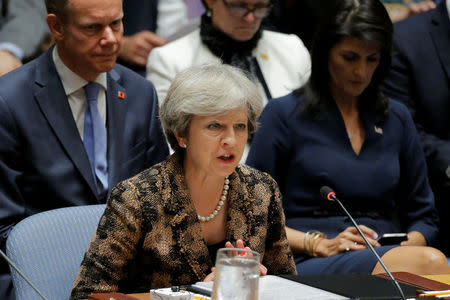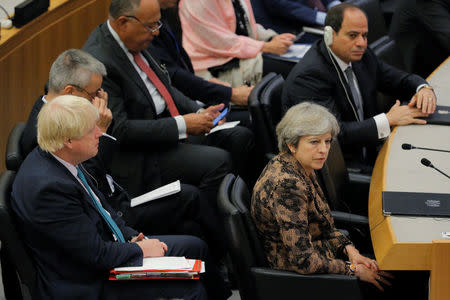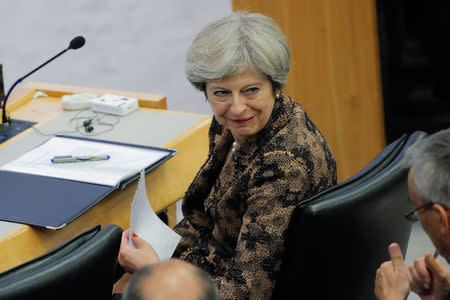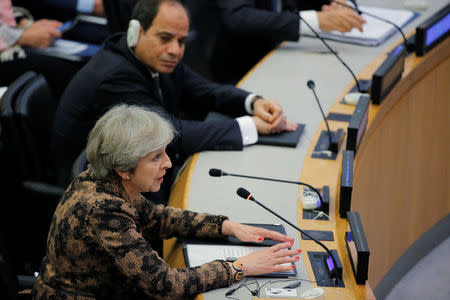As Brexit clock ticks down, EU eyes new offer from May
By Jan Strupczewski and Noah Barkin BRUSSELS/BERLIN (Reuters) - European capitals expect British Prime Minister Theresa May to try to break a deadlock in Brexit talks over the coming days by signalling a readiness to pay the EU to stay in the single market for a time after it leaves the bloc. Senior officials dealing with Brexit in Brussels, Berlin and other capitals said they had not received any concrete overtures from May ahead of a speech in Florence, Italy, on Friday, at which she is expected to flesh out her vision of Britain's future relationship with the European Union. And they played down a report in the Financial Times that her EU adviser, Oliver Robbins, had informed German Chancellor Angela Merkel and other leaders that May could make an offer of 20 billion euros to cover a post-Brexit transition period. "We have not been informed in advance about any concrete negotiation offers from the British government," a German government spokesman said. But the officials, speaking on condition of anonymity, said they had received signals from London that May would try to break a months-long impasse that has raised fears on either side of the Channel that Britain could exit the bloc in 2019 without a deal on its future EU ties. These officials said they expected May to signal soon that she would like to keep Britain in the single market for two to three years and was prepared to pay for the access. However, they were unsure whether it would come in the Florence speech or later -- possibly during new Brexit negotiations next Monday, in early October when she addresses her Conservative Party conference or at upcoming EU summits in the Estonian capital Tallinn or in Brussels. "Staying for three years in the customs union and single market would mean paying for it and Britain realises that. The acceptance of payments during that period would be a very big thing," said one EU official close to the negotiations. He was among more than half a dozen people involved with the issue in continental Europe who spoke to Reuters on Wednesday. Other officials were cautious, however, expressing concern that Britain was conflating two separate issues: the cost of continued market access after Brexit and the bill London first needs to pay to settle its existing financial commitments. "If everything in the financial settlement is not covered then it will be difficult to move forward," said one official in Berlin, referring to a "delicate moment" in the talks. CLOCK TICKING Three months into negotiations on the terms of Britain's departure from the EU, the two sides are struggling to resolve the issues Brussels says must be addressed before talks on a future trading relationship can begin. These include expatriate citizens' rights, the Irish border and the financial bill tied to Britain's departure. The EU executive has estimated that London may owe it around 60 billion euros due to commitments made during British membership. With the clock ticking down to the March 2019 exit date, Britain is keen to start talks on its future trade relationship with the bloc to remove the cloud of uncertainty for companies that do business between Britain and the rest of the EU. Without such certainty, companies in Britain may choose to move their operations to an EU state to enjoy access to its single market of 440 million people. Some have already announced such plans. Talks on the future relationship were initially expected to start in October. But the EU's chief negotiator, Frenchman Michel Barnier, has said that looks unrealistic -- so far. He will meet his British counterpart again on Monday in Brussels. European officials sent conflicting signals on Wednesday about whether an acknowledgement of Britain's financial obligations during a post-Brexit transition period might be enough to break the logjam and open the door to deeper talks. One senior official in a government broadly sympathetic to Britain said any offer of payment from May could be "positive" and that other EU leaders understood that she might seek to mix comments on exit and transition payments as a way to distract pro-Brexit voters at home away from concessions she might make. "The sense of reality has not yet arrived," a third senior EU official said. "If I were Mrs May I would make now a very, very clear offer, I would show my readiness." "I'm sure May will give a nice speech in Florence," a second German official added. "But what really counts is what the British put on the table in Brussels on Monday." (Additional reporting by Alastair Macdonald, Gabriela Baczynska, Andreas Rinke, Elizabeth Piper; Writing by Noah Barkin and Jan Strupczewski; Editing by Gareth Jones)

 Yahoo News
Yahoo News 



